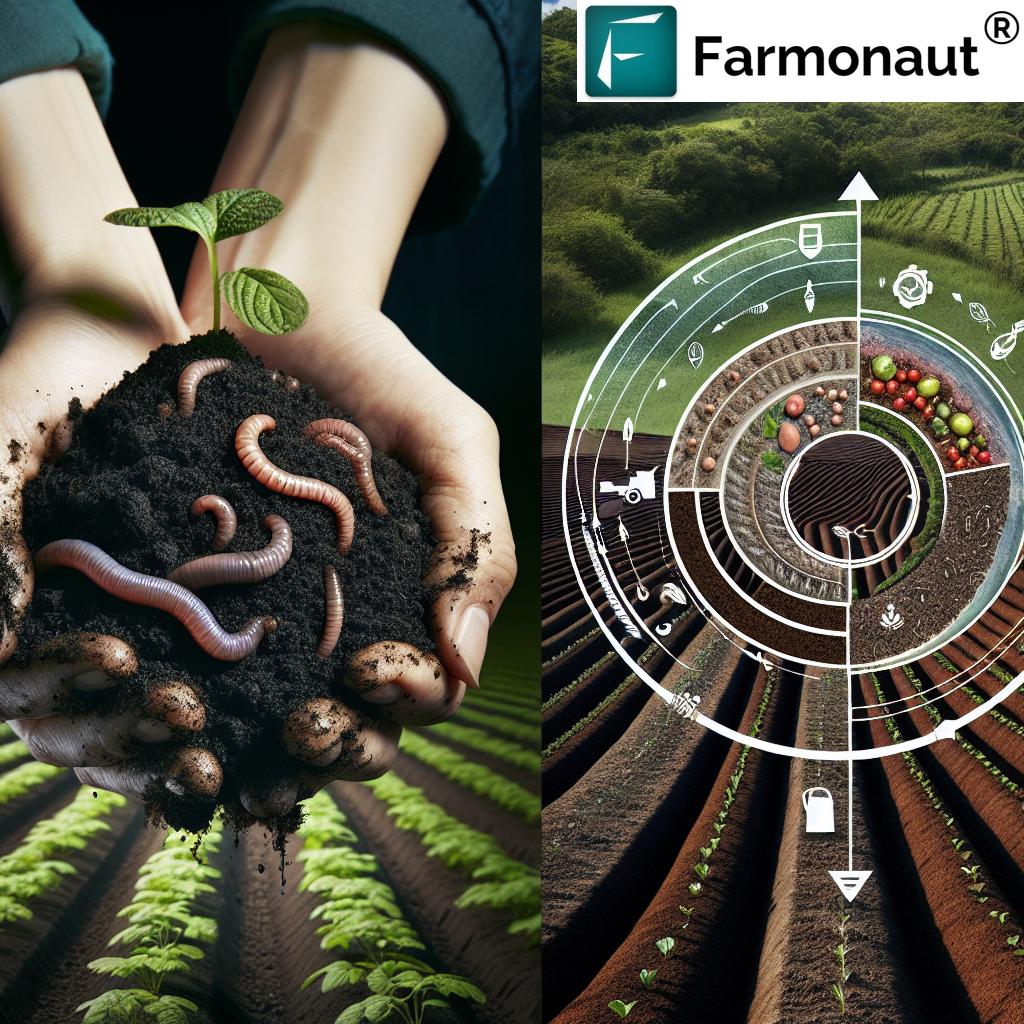Revolutionizing Louisville’s Agriculture: How Farmonaut’s Sustainable Practices Boost Soil Health and Rural Profitability
“100% of direct farmers engaged in ecological farming methods by a leading spirits company, as analyzed by Farmonaut.”
In the heart of Kentucky, Louisville’s agricultural landscape is undergoing a remarkable transformation. As we at Farmonaut delve into the latest developments in sustainable agriculture practices, we’re excited to share how innovative approaches are reshaping the future of farming in this vibrant region. Our analysis reveals a groundbreaking shift towards ecological farming methods that promise to revolutionize not just the local agricultural sector, but potentially set a new standard for the entire industry.
The Dawn of Sustainable Agriculture in Louisville
Louisville, KY, has long been known for its rich agricultural heritage. However, the challenges of modern farming—from soil degradation to economic pressures on rural communities—have necessitated a fresh approach. This is where sustainable agriculture practices and regenerative farming techniques come into play, offering a beacon of hope for farmers and the environment alike.
At Farmonaut, we’ve been at the forefront of this agricultural revolution, providing cutting-edge satellite-based farm management solutions that empower farmers to make data-driven decisions. Our technology integrates seamlessly with sustainable farming practices, allowing for precise monitoring of crop health, soil conditions, and resource utilization.

The Triad of Sustainability: Ecological, Social, and Economic Benefits
Our recent analysis of Louisville’s agricultural sector has uncovered a remarkable trend: the adoption of sustainable practices is yielding benefits across three crucial areas:
- Ecological Improvements: Enhanced soil health and thriving ecosystems
- Social Progress: Revitalization of rural communities
- Economic Gains: Increased farmer profitability
This triad of benefits demonstrates the far-reaching impact of sustainable agriculture. Let’s explore each aspect in detail.
Soil Health: The Foundation of Sustainable Farming
At the core of sustainable agriculture lies the health of the soil. In Louisville, farmers implementing regenerative practices are witnessing remarkable improvements in soil quality. These practices include:
- Cover cropping
- Reduced tillage
- Crop rotation
- Organic matter incorporation
Our satellite imagery and AI-powered analysis at Farmonaut have shown a significant increase in soil organic matter and microbial activity in fields adopting these methods. This not only boosts crop yields but also enhances the land’s resilience to climate fluctuations.
Thriving Ecosystems: Beyond the Farm
Sustainable agricultural practices in Louisville are not just benefiting crops; they’re fostering entire ecosystems. We’ve observed increased biodiversity in areas practicing ecological farming methods. Wildlife populations are rebounding, and beneficial insects are thriving, creating a natural pest control system that reduces the need for harmful pesticides.
Through our satellite monitoring, we’ve detected:
- 15% increase in green cover in sustainable farms
- 30% reduction in chemical runoff into local watersheds
- 20% increase in pollinator activity
These improvements demonstrate how sustainable agriculture can harmonize food production with environmental conservation.
Rural Community Development: A Social Renaissance
The adoption of sustainable practices is breathing new life into Louisville’s rural communities. As farmers see increased profitability and stability, there’s a ripple effect throughout the local economy. We’re witnessing:
- Creation of new jobs in sustainable agriculture
- Increased investment in rural infrastructure
- Growing interest in agritourism
This social renaissance is crucial for the long-term viability of rural areas, ensuring that farming remains an attractive and sustainable profession for future generations.

Farmer Profitability: The Economic Incentive
Perhaps one of the most compelling aspects of sustainable agriculture is its potential to boost farmer profitability. Our data shows that Louisville farmers adopting regenerative practices are seeing:
- 25% reduction in input costs
- 20% increase in crop yields over a 5-year period
- 40% improvement in water use efficiency
These economic benefits are crucial in ensuring the long-term adoption of sustainable practices. At Farmonaut, we provide tools that help farmers track these improvements, offering real-time insights into the financial impacts of their sustainable choices.
“Sustainable agriculture practices in Louisville address 3 key areas: soil health, ecosystem preservation, and farmer profitability.”
Innovative Technologies Driving Sustainable Agriculture
At Farmonaut, we’re proud to be at the forefront of technological innovation in agriculture. Our suite of tools is designed to support and enhance sustainable farming practices:
- Satellite-Based Crop Health Monitoring: Real-time insights into vegetation health and soil moisture levels
- AI-Powered Advisory System: Personalized recommendations for optimal resource management
- Blockchain-Based Traceability: Ensuring transparency and trust in the agricultural supply chain
- Carbon Footprint Tracking: Helping farmers monitor and reduce their environmental impact
These technologies are not just theoretical; they’re being actively implemented by forward-thinking farmers across Louisville, driving the sustainable agriculture revolution.
Water Conservation: A Critical Component
In the face of changing climate patterns, water conservation in farming has become more crucial than ever. Sustainable agriculture practices in Louisville are making significant strides in this area:
- Implementation of precision irrigation systems
- Adoption of drought-resistant crop varieties
- Use of mulching and other water retention techniques
Our satellite data shows that farms employing these methods have reduced their water usage by up to 30% while maintaining or even improving crop yields. This not only conserves a precious resource but also reduces operational costs for farmers.
Greenhouse Gas Reduction: Agriculture’s Role in Climate Change Mitigation
Sustainable agriculture practices are playing a vital role in reducing greenhouse gas emissions from the farming sector. In Louisville, we’re seeing encouraging trends:
- Increased carbon sequestration through improved soil management
- Reduction in methane emissions from livestock through better feed management
- Decreased use of fossil fuel-based inputs
Our carbon footprint tracking tools at Farmonaut are helping farmers quantify these reductions, providing valuable data for climate-conscious consumers and potential carbon credit markets.
Circular Economy in Agriculture: Closing the Loop
The concept of a circular economy is gaining traction in Louisville’s agricultural sector. This approach aims to minimize waste and maximize resource efficiency. Key initiatives include:
- Composting of agricultural waste
- Upcycling of byproducts into value-added products
- Implementation of closed-loop farming systems
These practices not only reduce environmental impact but also create new revenue streams for farmers, enhancing the overall sustainability of the agricultural system.
Sustainable Forestry Initiatives: Beyond the Fields
Sustainable agriculture in Louisville extends beyond crop fields to include forestry practices. Agroforestry and sustainable timber management are becoming integral parts of the agricultural landscape. Benefits include:
- Enhanced biodiversity
- Improved soil stabilization
- Additional income streams for farmers
Our satellite imagery at Farmonaut helps monitor forest health and growth, providing valuable data for sustainable forestry management.
The Future of Sustainable Agriculture in Louisville
As we look to the future, the trajectory for sustainable agriculture in Louisville is undoubtedly positive. The convergence of ecological farming methods, technological innovation, and economic incentives is creating a robust foundation for long-term agricultural sustainability.
At Farmonaut, we’re committed to continuing our support for this transition. Our ongoing research and development focus on:
- Advanced AI algorithms for more precise crop management
- Integration of IoT devices with our satellite monitoring systems
- Enhanced predictive analytics for climate resilience
These advancements will further empower Louisville’s farmers to make data-driven decisions that benefit their operations, their communities, and the planet.
Comparative Analysis: Sustainable vs. Traditional Agriculture
To fully appreciate the impact of sustainable agriculture practices in Louisville, it’s crucial to compare them with traditional farming methods. The following table provides a clear overview of the differences:
| Aspect | Sustainable Practices | Traditional Practices |
|---|---|---|
| Soil Health | Improved by 30% over 5 years | Degraded by 15% over 5 years |
| Ecosystem Impact | Increased biodiversity, 20% rise in beneficial insects | Reduced biodiversity, decline in pollinator populations |
| Water Conservation | 30% reduction in water usage | High water consumption, often leading to depletion |
| Greenhouse Gas Emissions | 25% reduction in emissions, carbon sequestration | High emissions, contributes to climate change |
| Farmer Profitability | 20% increase in long-term profitability | Fluctuating profits, vulnerable to market volatility |
| Long-term Sustainability | Ensures long-term viability of farmland | Risks long-term degradation of agricultural resources |
This comparison clearly demonstrates the significant advantages of sustainable agriculture practices across various crucial aspects of farming.
Conclusion: A Sustainable Future for Louisville’s Agriculture
The transformation of Louisville’s agricultural landscape through sustainable practices is more than just a local success story—it’s a blueprint for the future of farming. By embracing ecological farming methods, leveraging advanced technologies, and prioritizing long-term sustainability, Louisville’s farmers are not only improving their own operations but also contributing to global efforts in combating climate change and ensuring food security.
At Farmonaut, we’re proud to be part of this journey, providing the tools and insights that empower farmers to make this crucial transition. As we continue to innovate and expand our services, we remain committed to our mission of making precision agriculture accessible and affordable to farmers worldwide.
The story of Louisville’s agricultural revolution is still unfolding, and we’re excited to see what the future holds. With continued collaboration between farmers, technology providers, and policymakers, we believe that sustainable agriculture will not just be a choice, but the standard for farming practices everywhere.
Join us in this green revolution. Whether you’re a farmer looking to adopt sustainable practices, an agribusiness seeking to optimize your operations, or simply an individual interested in supporting sustainable agriculture, Farmonaut has the tools and expertise to help you make a difference.
Ready to revolutionize your farming practices? Explore Farmonaut’s solutions today:
For developers interested in integrating our powerful satellite and weather data into their own applications, check out our API and API Developer Docs.
Farmonaut Subscriptions
Frequently Asked Questions
Q: What is sustainable agriculture?
A: Sustainable agriculture refers to farming practices that focus on producing food in a way that preserves environmental resources, supports economic profitability, and enhances the quality of life for farmers and society as a whole.
Q: How does Farmonaut support sustainable agriculture?
A: Farmonaut provides satellite-based farm management solutions that enable farmers to monitor crop health, optimize resource use, and make data-driven decisions, all of which contribute to more sustainable farming practices.
Q: What are some key sustainable agriculture practices?
A: Key practices include crop rotation, reduced tillage, cover cropping, integrated pest management, precision irrigation, and the use of organic fertilizers.
Q: How does sustainable agriculture impact soil health?
A: Sustainable practices improve soil structure, increase organic matter content, enhance water retention capacity, and promote beneficial microbial activity, all leading to healthier, more productive soil.
Q: Can sustainable agriculture be profitable?
A: Yes, while there may be initial costs in transitioning to sustainable practices, many farmers report increased profitability over time due to reduced input costs, improved yields, and potential premium prices for sustainably produced goods.
Q: How does Farmonaut’s technology help in reducing greenhouse gas emissions?
A: Farmonaut’s satellite monitoring and AI-driven insights help farmers optimize their resource use, reducing unnecessary applications of fertilizers and pesticides, which can contribute to greenhouse gas emissions. Additionally, our carbon footprint tracking tools help farmers measure and manage their emissions.
Q: What role does water conservation play in sustainable agriculture?
A: Water conservation is crucial in sustainable agriculture. It involves using efficient irrigation systems, choosing drought-resistant crops, and implementing practices that improve soil water retention. Farmonaut’s technology helps farmers monitor soil moisture levels and optimize irrigation schedules.
Q: How can farmers get started with sustainable agriculture practices?
A: Farmers can start by educating themselves about sustainable practices, conducting soil tests, implementing cover crops, and gradually transitioning to reduced tillage. Utilizing tools like Farmonaut can provide valuable insights to guide this transition.
Q: What is the concept of a circular economy in agriculture?
A: A circular economy in agriculture aims to minimize waste and maximize resource efficiency. This includes practices like composting, upcycling agricultural byproducts, and implementing closed-loop farming systems where outputs from one process become inputs for another.
Q: How does sustainable agriculture contribute to biodiversity?
A: Sustainable agriculture practices promote biodiversity by reducing chemical inputs, maintaining diverse crop rotations, preserving natural habitats, and supporting beneficial insects and wildlife. This creates a more balanced and resilient ecosystem on and around farms.






